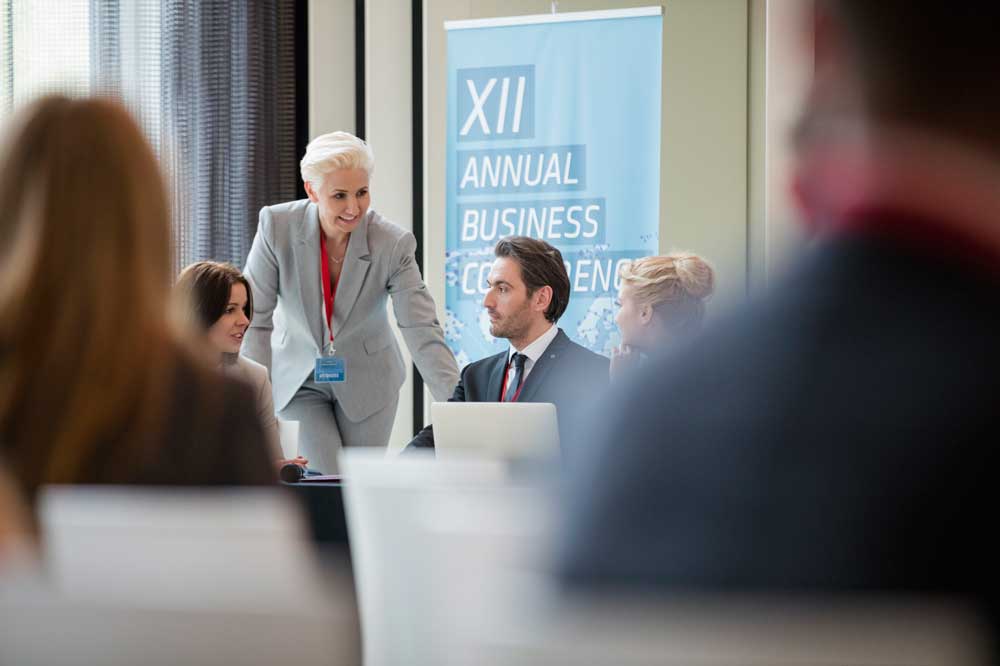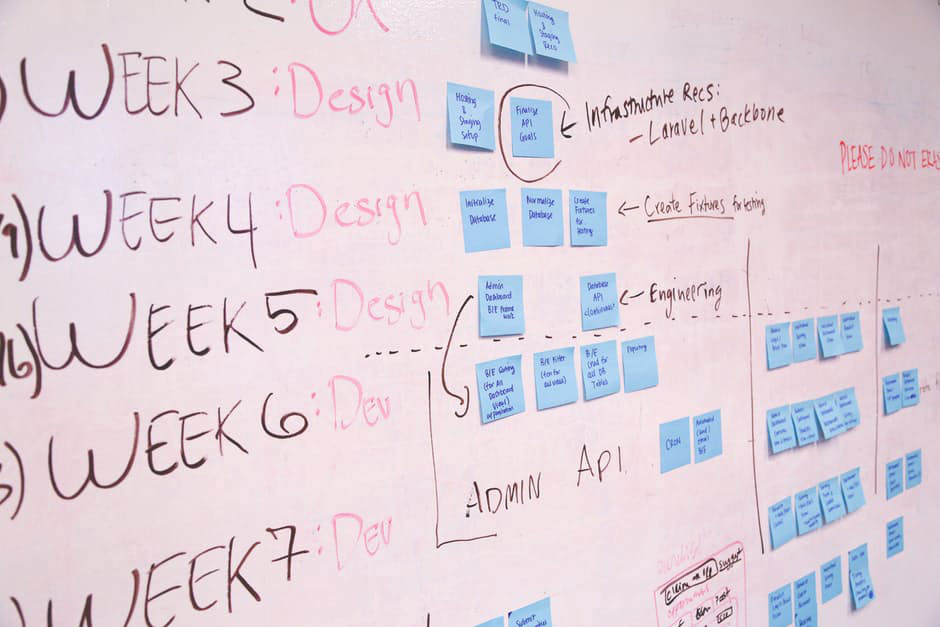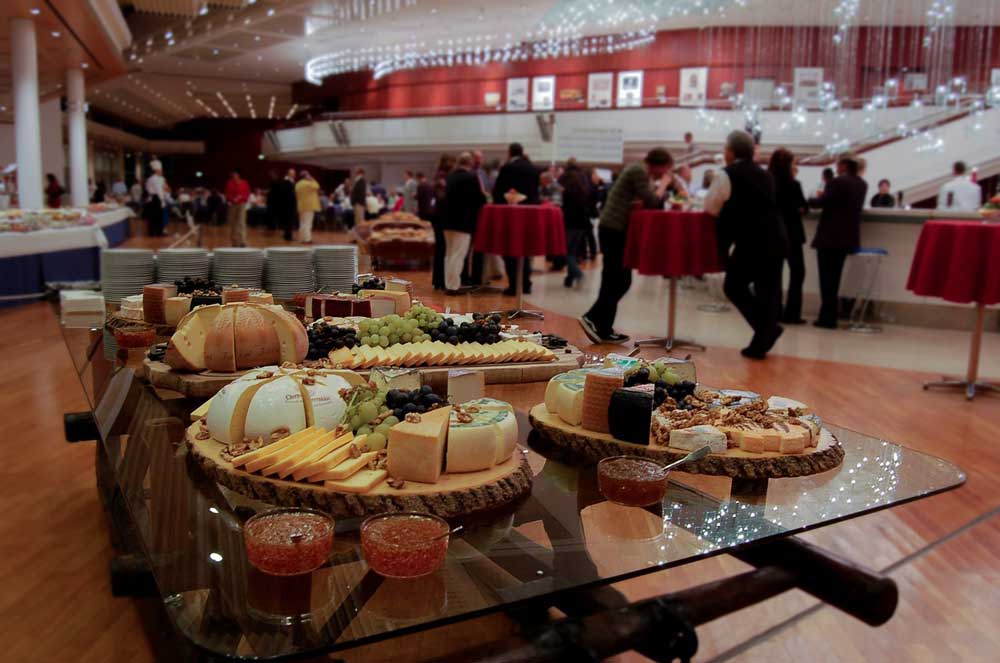In this section, we're going to look at a real meeting/corporate event planner job description—as described by a professional; Sharyn Scott, former Global Head of Events for international law firm Linklaters.
Meeting/corporate event planning is quite different to special event planning. While both share many similar aspects, such as budget management, technical production, and liaising with suppliers, there’s even more of an emphasis on logistics and contracts with corporate events and meeting planning.
This is because these events often involve travel and accommodation, in addition to the event itself. Therefore, more of a corporate event planner’s job involves managing the guest’s movements: how do they get there, where do they stay, how do they move around once they are there, how are they fed and entertained?
This might involve booking hundreds, if not thousands, of hotel rooms, flights, transfers, coaches, cars, and meals—sometimes a year or more in advance. Which is why the terms and conditions of contracts become so important; knowing what you can reserve, until what date, without charge, how much you need to confirm and pay for, by what date, and what you can and can’t cancel.

Meeting/corporate event planning also requires a different type of creativity. While in special events, you might spend months considering things like menus, table styling, and decorations, in a corporate environment these things are less of a priority. Instead, meeting/corporate event planning is more about creative problem solving; finding solutions to a brief that will make guests want to attend the event and enjoy their time there—while still fulfilling the necessary business objectives. Often, this means the emphasis is on proposing exciting locations, unusual/new venues, a stimulating event format—perhaps using innovative technology, and any supporting program of activities, excursions, social events, and entertainment.
Now let's hear a first-hand account of a meeting / corporate event planner job description from a professional:

Sharyn Scott is the former Global Head of Events for the law firm Linklaters, which has 28 offices throughout the United States and Latin America, Europe, Asia Pacific, the Middle East and Africa.
Sharyn’s role encompassed the full spectrum of corporate events from corporate hospitality, dinners, and staff holiday parties, to conferences, global partners’ meetings, and client receptions throughout USA, Europe, and the Middle East.
Prior to working at Linklaters, Sharyn organized events world-wide for Citibank, Barclays Capital, Credit Suisse, BNP Paribas and the travel company Going Places, a division of Thomas Cook.
“The first part of what we do is meet the internal client or host, (which, in Sharyn’s case, might be a senior partner at the law firm) and take a brief and ask some specific questions to get to the bottom of what it is they want to achieve from the event. You need to be confident about what it is you’re asking them and they need to be clear about what they’re asking you to do for them.
Sometimes they’ll just pick up the phone and say ‘can you organize this event for 25 clients?’ So you need to ask them, ‘what are you trying to achieve?’, ‘what do you want to get out of it?’, ‘what are the objectives?’ and especially, ‘what’s your budget?’ Because they may not know what their budget is, but they’ll know roughly what they want to spend.
The answers to these questions will give you a guideline to go away and think about how you’re going to fulfill that brief. How are you going to deliver for them an event that ticks all those boxes? How are you going to create something that people want to come to—something that’s different? It may just be a seminar—so what’s going to make them come through the door? That’s really the first part, to meet your host and get them to up open up about what they need.”

“Budget management is such an important part of what we do. It’s often the bit that people struggle with, because they may not have any financial training, or they may not be very good at math. You need to be able to very quickly understand Excel spreadsheets, understand VAT (sales tax), overseas tax—what you can and can’t reclaim, how flights—if it’s an overseas meeting—will affect your budget, how overseas tax rates can vary depending on what the item is, such as food and beverage or hotel rooms. Budget management is a very big part of what we do and every planner has to have those skills.
Once you have your budget, you then have to control it all the way through the project, making sure that when things change or the brief changes—say you have 50 extra guests at the last minute—it’s all updated accordingly. You’ve got to have your eye on that bottom line the whole time. For example, my biggest event budget is £1.5 million ($2.4 million) and I’ve got to be able to account for every penny of that.

So many things can change during the planning that will have a knock-on effect with the budget. You might have an event that was originally a buffet dinner for 500 people, then the host decides they want to have five different sit down meals for 100 people each in different restaurants instead.
Production costs relating to content change all the time. If you start a meeting or conference—say a year in advance—you often don’t know what the final content is going to be. You may have some external speakers that you have to bring in, who you have to pay fees and expenses. Or there may be a massive filming element; videos that need to be shot, which means production, editing and video costs have to go into the budget. On-site you might have budgeted for 25 coaches, but actually you need 35 coaches, because your flight patterns only allow you to get 50 people on one coach at the same time. Or you might have budgeted for 250 hotel rooms, but the meeting/conference turns out to be more popular, so at the last minute you need 300 rooms.
You’ve really got to stay on top of the budget at all times throughout the planning process.”
“Once the budget is signed off and you know where your event’s going to be and what it looks like, then it’s all about project management. You need to create a project plan; all the things that need to be done between now and the event to make it happen.
In a corporate environment, it’s important to have a solid project plan with timeline—so we can look at the dates we think we need to have achieved things by. If you’re sitting down with your host, and they’re very nervous about the event, you can say, ‘this will have happened by this date’, or ‘I need you to have achieved these things by this date’, which will put them at ease and make sure they know what’s required of them.
The project plan is very much a shared tool for staff, as well as a reporting tool for updating clients, because you could have up to five people working on one event; one on delegate management, one on budget, one on content, one on production, and one on logistics.

So everyone needs to be able to see, ‘this is where we are on the project’, and ‘this is where we need to be by next month’, we use it all the way through the planning process. It’s important because you need to be able to understand the domino effect of what all those actions are, so that if I haven’t done my bit on that plan, how does that affect the rest of it.
For example, if I haven’t written the joining instructions going out to all the guests (i.e. telling them you’re booked on this flight, to arrive here, here’s the program, here’s the dress code etc.), then the person sending them out can’t send them out. So the person going to the meeting/conference hasn’t got the right information, so they’re turning up thinking, ‘I don’t know where I’m going’,’ I don’t know when my flight is’, or they’re phoning the hotline trying to find out.
There are a lot of things on that project plan that are really essential and I always advise my staff to sit down and do their own—whatever event they’re doing, even if it’s a really small dinner. If you need input from someone externally, you need to think ‘when do I need that input by?’ ‘When do I need to have agreed the food?’ ‘When do I need to have agreed the lighting?’ ‘When do I need to have appointed the lighting person?’ It’s a very useful part of project management.”
“Once you’ve got your project plan, your budget, and maybe you have your venue lined up, the other big part of what we do is contracts.
I think people are often surprised when they first come into the industry, how much is involved in a contact. It’s essential to understand the terms of a contract and really know what you’re signing up for. Things like your attrition rates for releasing hotel bedrooms—are they realistic? Are they what you want? If you’ve booked 300 bedrooms, but on the day you only need 210, what are your get-out clauses? What if something goes wrong—what if there’s a volcanic ash cloud again and all flights are suspended for days—am I protected? How much am I protected? What are my cancellation terms if we decide to pull the plug on the event? How much am I signing up for? How much am I paying in advance for this? What’s my security? If the hotel has a flood, can they move my event? If they do, what’s the impact and what will my cost savings be? The contract is key.
"A great example of a contract oversight happened on an event I inherited. It was a two-day conference in a hotel in London for a pharmaceutical team. I was on my way to do the set-up when I got a call from the AV company, who were already in the room installing the stage set. The set was being installed overnight, before the first day of the conference, where it would stay for the two-day duration of the event. The hotel had told the AV company that they had to remove the stage set at the end of day one, and then re-install it again the morning of day two because they had another event—a dinner—in the room on the evening of day one.
Sure enough, the person who had made the booking had only contracted the room for two days; they hadn’t booked it on a 24 hour basis. You see, most hotel booking systems treat days and evenings as two separate slots, and they charge you separately for each. In our contract, the room had only been booked for two days; it hadn’t been booked on a 24-hour basis, so they were expecting us to vacate the room at the end of each day.
Unfortunately, neither the original event planner, nor the hotel, had picked up on this until the day of our event—and by then they already had a confirmed booking for an evening event in the same room. They were quite within their rights, as per the contract, to kick us out of that room at the end of day one to make room for their dinner. Of course, for us, there just wouldn’t have been enough time to dismantle our set at the end of the day and then re-build it again before day two of our conference.
Fortunately, I eventually managed to have the dinner moved. Thankfully, it was a hotel that was big enough that it had other rooms. But it took an awful lot of persuasion to get them to agree to move the other event, because they were quite within their contractual rights to boot us out of that room. Imagine if the hotel hadn’t had another room to move the dinner to?"
"When it comes to contracts, you also need to understand the purchasing power you have when you’re booking a large event at a hotel. We now have a contract checklist so that everyone on the team knows the bare minimum we expect them to negotiate. For example, we expect an event room for free, we expect to pay 90 percent of the cost of rooms—absolute maximum—less where we can, always 15 percent attrition up to 14 days in advance, and our cancellation terms aren’t from the date when we book the event, instead we work backwards from the date of the event itself. So if I’m booking an event two years in advance, I don’t want my 50 percent deposit to be due when I sign the contract; I want it to kick in at a certain date working back from the date the event is scheduled.
All these are contractual things that you need to be able to negotiate to make sure you’re getting the best deal, and that’s an important side of event planning that a lot of people don’t think about.”
“Another key element is the creative side; being able to think outside the box and come up with really creative solutions—and that’s not just about how you make the room look pretty. It’s about; ‘OK something’s gone wrong, I need to think my way out of this—how are we going to solve this problem and resolve whatever it is that’s gone wrong?’"
"I had an event, early on in my career, part of which included lunch for 1,200 people—and basically, the lunch didn’t arrive. The catering supplier had decided to present lunch as canapés, served by six wait staff. Six wait staff for 1,200 people! The guests were already hungover from the night before, they were getting angry and hungry, and some were starting to leave the building. So we had to think really quickly, ‘how were we going to find a solution for this nightmare situation?’"

"First, we had to get everybody back inside and start the next session early to buy us a bit of time. We then sent all staff out to local shops and supermarkets to buy whatever food we could; bread, crisps, buns, cakes, fruit, and lay it out buffet style so they literally had something to eat. We even ended up serving things from McDonalds—which is not something you usually get at a corporate event—but by then it was just about feeding them; no matter what. Being able to calmly think your way through a crisis and come up with a solution is all part of the creative process."
"You also have to be creative when you’re proposing events to clients. I’m always getting asked to come up with new and interesting ideas for team building. It’s one of those things that leaves everyone cold—it’s always a treasure hunt around a city. So I have to think about how we can make this more interesting, and it usually comes back to, ‘what are they trying to achieve with a team-building event?’ We did one recently where we took over a private island near Cannes in the South of France to do a wine tasting—which involved negotiating with some monks who have a vineyard on the island. It was something really different and very special. That was something that people wanted to go to because they wouldn’t usually have the opportunity to do something like that.”
Read what Sharyn Scott, former Global Head of Events for international law firm Linklaters , believes are the pros and cons of being a meeting/corporate event planner.
